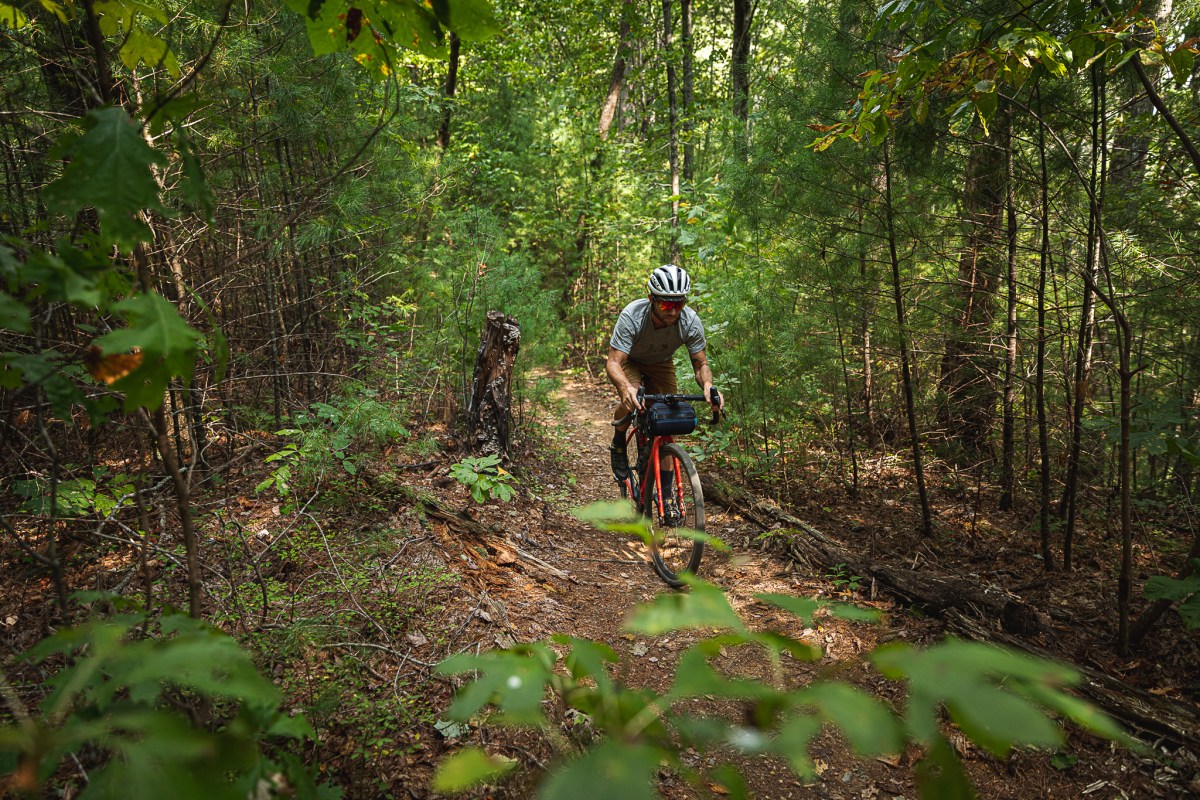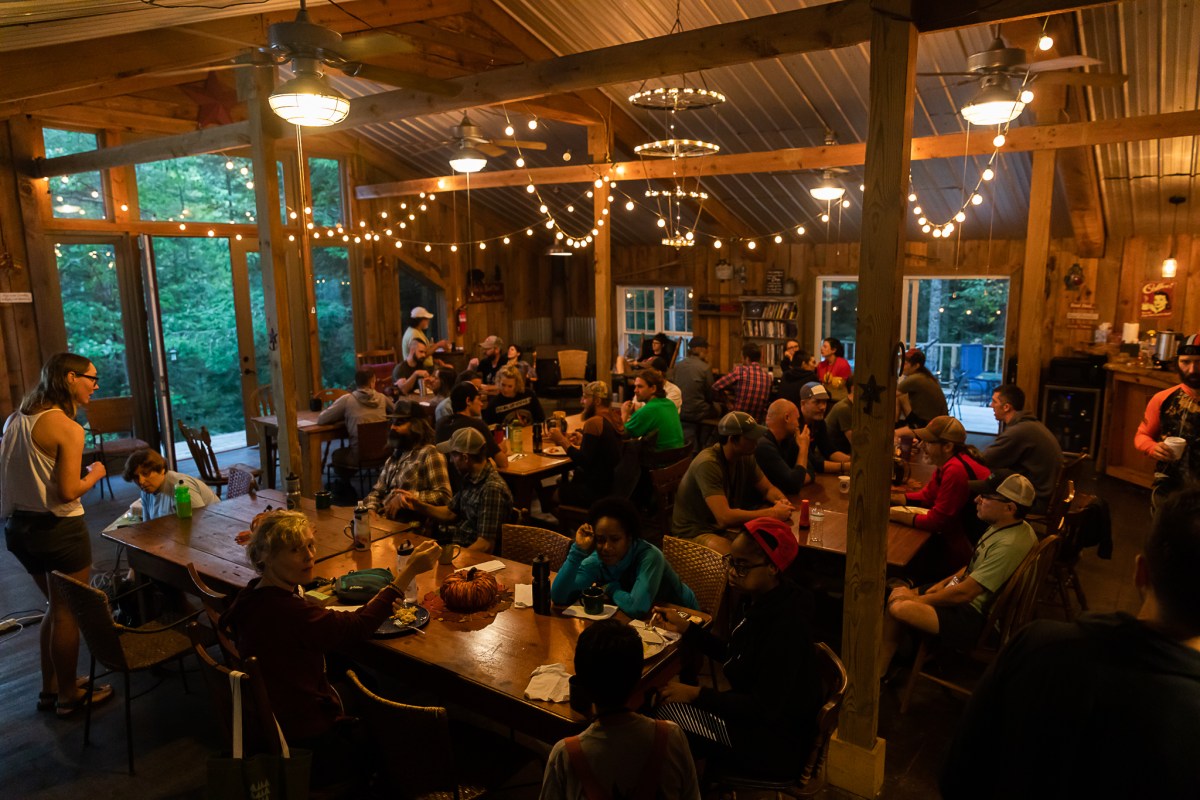It’s breakfast time at Mulberry Gap Mountain Bike Getaway and the final day of the third annual Bikepacking Summit, a three-day grassroots event that’s equal parts summer camp and bikepacking seminar. Mulberry Gap co-owners Kate and Andrew Gates stand behind a counter flipping pancakes while greeting a steady stream of cyclists.
“This is my dream come true having this event here,” Kate says. “We’re bringing nationwide recognition to this tiny little dot on a map.”
That tiny little dot is the town of Ellijay, Georgia, population 1,719. Situated 80 miles north of Atlanta in the foothills of the Blue Ridge Mountains, this rural community is the seat of Gilmer County, the state-designated “Mountain Biking Capital of Georgia.” (It’s also known as the “Apple Capital of Georgia.”) Hikers have long known Gilmer County as home to the southern terminus of both the Appalachian Trail and the Benton MacKaye Trail. But in 2005, when the 355-mile multiuse Pinhoti Trail was finally completed in Gilmer County, mountain bikers started showing up in droves.
“Ellijay is the perfect small mountain town,” says Dondi Fontenot, who co-owns Cartecay Bike Shop in town. “It’s still a diamond in the rough, but agritourism and outdoor tourism has really driven the development of downtown.”

Photo Credit: Jess Daddio
Surrounded by over 100 miles of singletrack and gravel roads, Ellijay has blossomed into its own as a mountain bike destination. Not long after opening in 2007 as Mulberry Gap Bunkhouse Inn and Camping, the Gateses changed the name to Mulberry Gap Mountain Bike Getaway and began catering specifically to the influx of mountain bikers coming to Ellijay. And while cycling events like the Bikepacking Summit are still relatively small compared to Ellijay’s signature Georgia Apple Festival (which annually brings in upwards of 20,000 people per day), they give visiting cyclists an intimate portrait of an oft-overlooked region and its unique riding.
“It kinda felt like I was riding through the jungle,” says Lael Wilcox, a pro endurance cyclist from Alaska who rode part of the 357-mile Trans North Georgia route prior to the Bikepacking Summit. “It was really humid and there were lots of stream crossings. The Appalachians are super steep with nonstop climbs. But for me, any race or route that has a ton of climbing is exactly where I want to be.”
Whether or not you appreciate steep terrain as much as Wilcox does, Ellijay offers plenty of riding for mountain bikers of all skill levels. With mild year-round temperatures, crowd-free singletrack and more trails on the way, Ellijay is on a quest to become the Southeast’s premiere mountain biking hub. Here’s where to eat, play and stay in Ellijay.

Photo Credit: Jess Daddio
EAT AND DRINK
This downtown cafe is tucked away on a quiet part of North Main Street. Filled with an eclectic mix of couches and cozy seating areas, this cafe feels less like a coffee shop and more like your family’s living room. Fuel your ride with an espresso and an Appalachian Sunrise panini served on homemade bread.
Based out of a 19th-century-era hotel at the corner of River and Main Streets, this pizzeria’s Springer Mountain BBQ Chicken Pizza, named for the southern terminus of the AT, is the perfect way to recharge after a big day on the trail.
MooBears Ice Cream and Hot Dogs
Located on River Street, this family-owned ice cream joint is only open from March to December, but with over 20 flavors of ice cream, craft soda, chocolates and a lot of candy, it’s the ultimate one-stop sweet shop.
PLAY
Amadahy Trail
Best for Novice Riders
Mileage: 3.6
Elevation Gain: 293 feet
Located in the 5,626-acre Coosawattee Wildlife Management Area, the flowy Amadahy Trail is tucked into the woods surrounding the 3,200-acre Carters Lake. Fun and mostly flat, it’s a great non-technical loop for families and novice riders looking to get out for a quick ride. Cartecay Bike Shop leads weekly Saturday social rides and regularly includes the Amadahy Trail in its rotation. There is no fee for riding here, but donations to the North Georgia Mountain Bike Association are encouraged.
Bear Creek, Pinhoti 1, Pinhoti 2
Best for a Singletrack Sampler
Mileage: 23.6
Elevation Gain: 3,002 feet
This ride starts and ends at Mulberry Gap Mountain Bike Getaway, which offers day parking, WiFi, restrooms and showers, all for $10 per person. The gravel climb up Potato Patch Road to the Bear Creek Overlook is relatively mellow, but if you want to save your legs, Mulberry Gap will shuttle you to the top (prices vary from $10-$30 depending on the size of your group). Be on the lookout for wildlife as you cruise through the lush rhododendron forests. Dropping in on Bear Creek, riders are rewarded with everything from tight switchbacks to fast doubletrack. Keep an eye out on your right for a sign recognizing the Gennet poplar, a 400-year-old tree that still stands as testament to the forest of centuries past. Give the poplar a hug before heading up Pinhoti 1 for a mile-long climb. From here, you’ll roll up and down along everything from singletrack to doubletrack and gravel roads, eventually tracing one last ridge and descending Pinhoti 2 to Mulberry Gap.
Best for Gravel Grinders
Mileage: 291
Elevation: 33,746 feet
Named after a furry member of the Mulberry Gap family, the Cohutta Cat blends smooth singletrack, doubletrack and gravel roads together to create a nearly 300-mile-long figure-eight bikepacking route that straddles the Tennessee-Georgia state line. Highlights along the way include brewery stops, the Ocoee River Whitewater Center used for the 1996 Summer Olympics in Atlanta, and a 270-foot-long suspension bridge over the Toccoa River. On average, the Cohutta Cat takes intermediate riders four days to complete, but REI Regional Experiences Manager and Cohutta Cat route developer Daniel Jessee says the route is an adventure no matter how much of the Cat you tackle.
“It has some great progression for people of varying skill sets,” Jessee says. “The eastern loop is shorter with less climbing, while the western loop is hard all by itself and much more remote. Even the strongest riders will feel it.”
Trans North Georgia Adventure (TNGA)
Best for a Suffer Fest
Mileage: 357.4
Elevation Gain: 56,000 feet
The woods in North Georgia might be lovely, dark and deep, but the trails are brutally steep. So riders who attempt the Trans North Georgia Adventure (TNGA), which bisects the state from South Carolina to Alabama, should be prepared for adversity in all of its capricious forms including mind-melting humidity, rampant poison ivy, trench foot and plenty of hike-a-bikes.
“I don’t think people know that there’s this much climbing in Georgia or the Southeast, so they get here and they’re shocked,” says TNGA veteran Audrey Tangye. “The climbing never ends.”
Of course, the beautiful Blue Ridge Mountain views, crystal-clear waterfalls and verdant hardwood canopy make all of that punishing singletrack worth it.
STAY
Mulberry Gap Mountain Bike Getaway
This backcountry retreat is just what it sounds like—a dreamy mountain bike oasis surrounded on all sides by the Chattahoochee National Forest. Post up in a rustic cabin (from $65 per person per night) or pitch a tent (from $19 per person per night), and your stay will include the use of bath houses, WiFi and bike wash stations. Though you can bring your own food and cookout, eating at Mulberry Gap is highly recommended. Ginni Taylor, mother of co-owner Andrew Gates, whips up fabulous Southern fare three times a day (from $12 per adult). Stay up late at The Barn, a communal dining hall and hang zone where visitors can connect with new friends around a campfire or over a game of mini-bike Jenga (it’s harder than it sounds).
